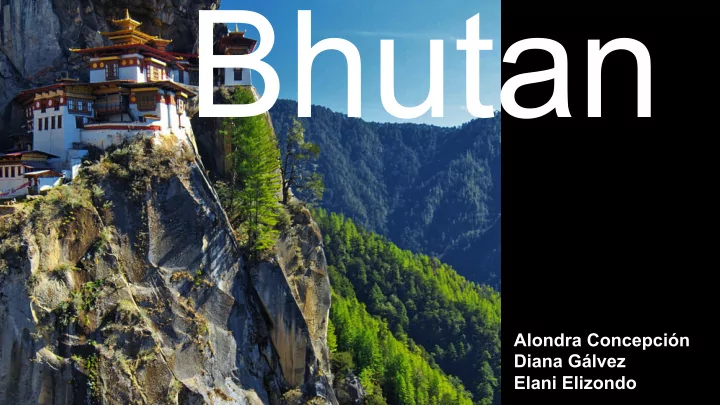

Bhutan Alondra Concepción Diana Gálvez Elani Elizondo
• Located in the Middle East population: 765,552
Origin of Bhutan: • Unitary Parliamentary Constitutional Democracy. • Bhutan's first national elections in March 2008 marked the country’s shift from an absolute monarchy to a constitutional monarchy.
Origin of the United Kingdom: • Two party Parliamentary monarchy. • The constitutional monarchy was developed in the eighteenth and nineteenth centuries. • The Bill of Rights Act set the foundations for the constitutional monarchy.
Who governs in Bhutan? Government: • Head of state: King King Jigme Khesar Namgyal Wangchuck. • Head of government: Prime Minister Tshering Tobgay. Legislature: • Upper House: National Council • Lower House: National Assembly
Who governs in the United Kingdom? • Parliament: highest legislative authority. • Crown’s power is mostly ceremonial.
Bhutan Government Structure: Government Structure • Executive Branch – Chief of State: King Wangchuck – Head of Government: Prime Minister Tshering Tobgay – Cabinet • Legislative Branch: bicameral Parliament – National Council – National Assembly • Judicial Branch – Highest Courts ( 5 justices including the chief justice) – Subordinate Courts (first appellate court)
Government Structure United Kingdom
Leader of the majority party in Parliament is nominated as the prime minister Monarchy is hereditary ¡
• The head of state must retire by age 65 • The head of government (Prime Misiter) can be removed by a 2/3 vote of Parliament
• Monarchy is hereditary • 646 members of the House of Common are elected • The leader of the party with the majority of people elected is made prime minister
Legal system: • Zhabdurung Ngwang Namgyal promulgated the first set of Bhutanese laws. • “The Code”: foundation of the contemporary Bhutanese legal system, based on Buddhist principles and address the violation of temporal and spiritual laws. • Laws contain specific reference to the ten pious acts. • (1959) National Assembly enacted the first comprehensive codified law code. • The Supreme Law: covers civil and criminal, includes land law, marriage, inheritance, etc. • The current legal system is based on English common law. • The Bhutanese Judiciary is entrusted to safeguard justice.
Legal System United Kingdom: • Government proposes bills • must be agreed upon the two houses of parliament: House of Commons and House of Lords • It becomes an act when the bill is approved and singed by the queen ¡
Advantages Bhutan: Buddhist values guide the relationship between the state and the people.
Advantages U.K • The monarchs create public income. • The royal property portfolio is worth over 7 billion and includes key developments, historical buildings, farmlands, etc.
Disadvantages: • The market in Bhutan is not largely open to foreign countries. • The government is concerned about protecting traditions and culture, it is not willing to accept foreign investment.
Disadvantages U.K • The UK is a smaller consumer market than that of US, China or Japan. • Its shoppers spend more money online. • Business-to-consumer online sales in the UK were on average $3,585 per person.
Other Differences Bhutan U.K. • Bhutan is one of the most • UK has the world’s 8 th biggest exclusive travel destinations in with 32 million visiting in 2013. the world. • Domestic tourism remains the • It enjoys a reputation for biggest component of tourism in authenticity, remoteness and well the UK. protected cultural heritage and natural environment. • The tourism is limited to prearranged tours with a local guide.
Recommend
More recommend